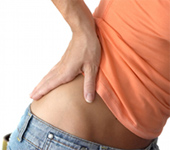
 Mums have one of the toughest jobs out there. They’re busy and sleep deprived, and many suffer through aches and pains unnecessarily and for far too long.
Mums have one of the toughest jobs out there. They’re busy and sleep deprived, and many suffer through aches and pains unnecessarily and for far too long.
Here are a few of the more common mummy injuries, and ways to tackle them before they tackle you:
![]() Neck and upper back pain
Neck and upper back pain
One of the main complaints we get from mums at our clinic is constant pain in the neck and upper back/shoulder areas. Typically this pain comes from carrying and picking up kids (remember to use your knees, not your back), as well as the slouched posture many mums take when breastfeeding. If your child is getting too heavy to carry comfortably, look for alternatives such as a stroller, or a specially designed carrier intended for the weight of your child as well as your comfort. Using a pillow to support the baby while nursing helps, as does sitting up straight with your feet on the ground, and moving around when you get a break. You can also try a variety of breastfeeding positions to help alleviate poor posture and pain.
![]() DeQuervain’s Syndrome
DeQuervain’s Syndrome
Often seen in new mums, this injury is an inflammation of the tendons that control the wrist and thumb. The hallmark of DeQuervain’s Syndrome is sharp pain with wrist and thumb movement. Holding the baby in the same position, for long periods of time, can put tension on the tendons. Most often the wrist that supports the baby’s head is affected, and bottle-feeding is another trigger. The best first aid care is ice and bracing of the painful wrist and thumb (your physiotherapist can recommend the right brace for you), and keeping the wrist neutral and relaxed while holding the baby or bottle. Persistent pain may require anti-inflammatories and further treatment.
![]() Pelvic floor dysfunction
Pelvic floor dysfunction
Many women experience weakness of the pelvic floor muscles after childbirth, which can cause urinary incontinence and lower back pain. One solution is to do Kegel (KEY-gul) exercises, but properly engaging the correct muscles to help recovery can be tricky. Kegel exercises strengthen the pelvic floor muscles, which support the uterus, bladder and bowel. Your physiotherapist can guide you through this process. If one of these common mummy injuries is ailing you, try the suggestions above or seek treatment. The key is to not wait until pain knocks you flat on your back. You can only be the best mum to your kids if you first take care of yourself.